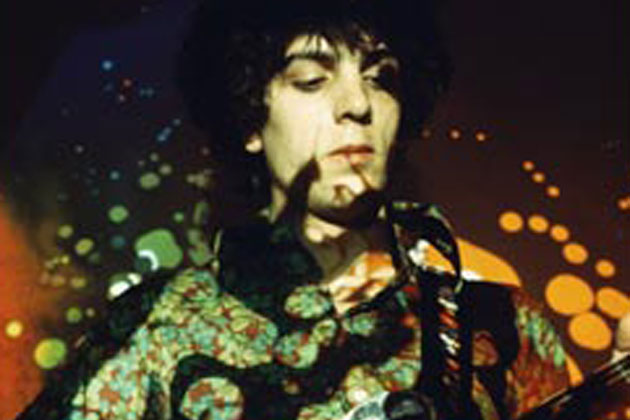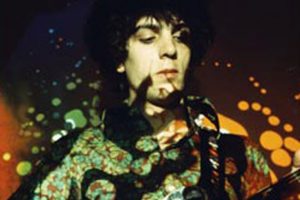I believe that most occultists that have done any study of the 60’s socio-cultural revolution in Western countries would agree that Aleister Crowley’s writings and vision had a noticeable impact on same. You don’t believe me – buttonhole Lon Milo Duquette at Notocon and ask HIM! Anyway, here’re some interesting and pertinent essays from producer Joe Boyd’s newsletter. Boyd discovered and produced records by early Pink Floyd (“Arnold Layne”!), the Incredible String Band, Nick Drake, Fairport Convention… and later would produce Nico Maria Muldaur, R.E.M….
ENJOY!
“…Apple Music (Beatle rather than Jobs variety) asked me to explain the relationship between the Fab Four and the London Underground for the hard-cover book accompanying the fiftieth anniversary edition of Sgt Pepper.
“So I’ve included parts of both for your further entertainment.
“Like many budding British guitarists, Syd worshipped Bo Diddley. But he was equally excited about the paintings of Jim Dine, Chaim Soutine and Robert Rauschenberg, the writings and illustrations of Edward Lear, the absurdist humour of Peter Cook and Hillaire Belloc as well as William Burroughs’ and Brion Gysin’s cut-ups. And then he encountered the acronyms that would provide his most profound influences, AMM and LSD. Long before the Beatles bragged about dabbling in psychedelics, Syd and some Cambridge friends had opened their minds with the pure, Swiss, Sandoz hallucinogen. Boundaries between what Bo Diddley was after with his boogie’d-up Latin clavé rhythm and the sort of juxtapositions Gysin and Rauschenberg were chasing dissolved in the flick of an acid-tab. Now Syd was ready. When he saw AMM guitarist Keith Rowe applying lessons learned in art-school to the guitar, it made complete sense to him.
Rowe was confronting the same issues as Syd and other British guitarists, but starting from a different point. He was a jazzer, a follower of American masters Jim Hall and Wes Montgomery, playing West Coast cool at night while studying the abstractions of Jackson Pollack at art school by day. Rowe decided to tear down the walls between his two artistic personalities; soon afterwards, Syd followed.
Rowe and AMM rejected all notions of ‘entertainment’. They committed themselves to moment-by-moment inspiration, which might mean turning on a short-wave radio, spinning the dial and letting it join in the improv, or running a cigarette lighter up and down the guitar or piano strings. Observing Rowe convinced Syd that there was more to playing guitar than technique. For a start, he experimented with laying the guitar across his lap where it stopped being a phallic extension and became an object he could control in any number of different ways.
In abandoning virtuosity (the chosen goal of most British guitar players from Clapton to Beck to Lee to Thompson to Page), Syd was moving British pop further along a road it had already travelled. I’ve always believed that British groups’ lack of instrumental fluency gave them an advantage. The archetypal American band was full of great ‘pickers’ who could jam convincingly in country-rock, blues, r&b, folk or maybe a bit of jazz. Every town in the US has bars with bandstands and live music until long past British pub closing times, and work aplenty for the dedicated muso. Then add after-hours sessions, dressing room jams, home get-togethers and casual pick-up gigs, all largely American phenomena. Mastery, I’m convinced, can flatten out originality.
British groups were formed to get girls, glory and money (usually in that order) and generally consisted of boys who could, at the start, barely play their instruments. All they needed was to learn the chords to songs created by the group’s strongest personality. Far from being a problem, this “handicap” produced music that had the instrumentation and some of the texture of American rock ‘n’ roll but was startlingly original. They couldn’t play the clichés well enough to fall back on them.
Led by their first lead guitarist, deft jazz buff Bob Klose, The Tea Set (as the Floyd were initially known), made desultory attempts to cover some Elmore James and Jimmy Reed numbers. But when Klose failed his mid-terms, his parents made him quit the group to concentrate on his degree; such were the middle-class anxieties that thrust Syd Barrett to the forefront of the not-much-longer-to-be-called Tea Set.
I used to have a hash-burn-studded copy of the Philips gatefold blues reissue dedicated to the 1930s recordings of Blind Boy Fuller, an itinerant Carolina blues man who was once so popular that Big Bill Broonzy recorded a song in which he threatened to come to Charlotte and take away all of Fuller’s women. Paul Oliver, a British blues expert whom most musicians viewed with awed respect, contributed a lengthy set of liner-notes in which, setting Fuller into context, he mentioned other wandering singers from the same area. We don’t know whether Syd ever listened to the record; certainly nothing in his playing reveals much Fuller influence. But buried in Oliver’s notes are the names Pink Anderson and Floyd Council and Syd appropriated them, Rauschenberg-like, as the group’s magical talisman. Nothing could be further from Dylan’s reverence for the Harry Smith box set.”
Having taken a chunk out of the middle of the V&A piece, here’s the beginning and end of the Pepper article.
“The night I met Sandy Denny, in the last week of May 1967, she convinced me to drive her back to her parents’ house in Wimbledon at 3 o’clock in the morning. The lure? A friend had recorded Radio Luxembourg’s advance airing of “Sgt Pepper” and loaned her the tape. That was enough for me; we headed off into the night for the long drive from Soho to the farthest reaches of southwest London.
In the dark, silent house, she made me take of my shoes and tiptoe. When the opening fanfare blasted out from the small reel-to-reel recorder, Sandy panicked. We’ll wake my parents and they’ll be furious! We ended up in the front-hall closet, seated among the boots, shoes, umbrellas and overcoats of a middle-class English household, spell-bound in the pitch dark, gripped by the extraordinary sounds coming from the tinny little speakers. For the next few days, I bragged to everyone I met about what I’d heard, of what was in store for the world.”
* * *
In some ways, June was a nightmarish climax to all that had gone before. Pink Floyd became the first pop group to play at the South Bank, which triggered spluttering outrage from arts critic Hans Keller on the BBC. UFO’s crowds were huge but Hoppy was targeted by the drug squad and sentenced to eight months in Wormwood Scrubs. Jagger and art-dealer Robert Fraser were also sentenced to prison. The vindictiveness of the authorities grew more intense, while the ideals of the London Free School, Hoppy, UFO, Indica and the legions of freaks who supported us were commercialized and reflected back at us in ways way barely recognized.
But June was also the month of Sgt Pepper. At the end of the month, the venerable “Times” of London published their famous “Breaking A Butterfly On A Wheel” editorial that counselled the authorities not to over-react to youthful experimentation. By the end of the summer, things had calmed down. I have always believed that the Beatles’ magnificent creation was a huge contributor to the shift in attitude. If taking acid can lead to such beautiful and inspiring music, can it really be so dangerous? Even the stuffiest and most isolated politicians and pundits couldn’t avoid those songs; everywhere one turned that summer, you heard “Lucy In The Sky With Diamonds” or “A Day In The Life”. It was our first experience of omnipresent music – shops played it, coffee bars turned on the radio to hear it, no one could get enough of it. It was the perfect musical manifestation of that agape spirit that pervaded the “underground” at the start.
The world, the Beatles, the London freaks – all would follow complicated paths in the years after that Summer of Love, 1967. But I think rarely has an item of mass consumption so perfectly mirrored the revolutionary spirit of a time – and helped guide that time towards a (relatively) soft landing. Sandy Denny, meanwhile, felt, after hearing Sgt Pepper, she could no longer aspire simply to being the Queen of the Folk Clubs. Only a bigger broader canvas would suffice; by the winter, she had joined Fairport Convention.


